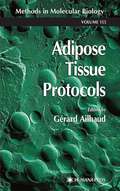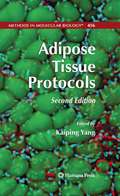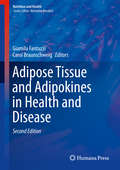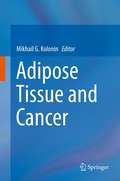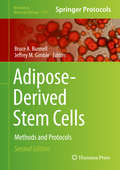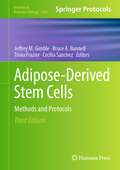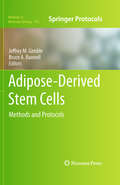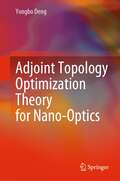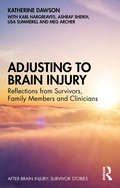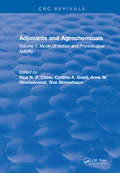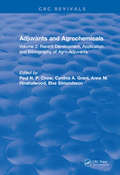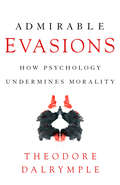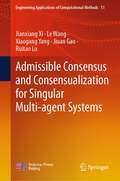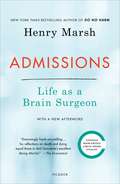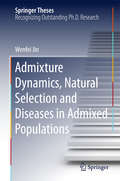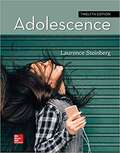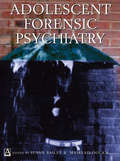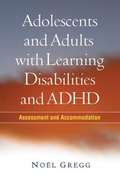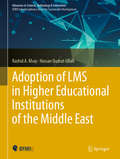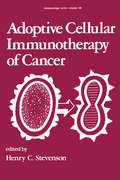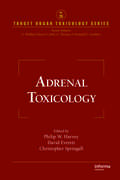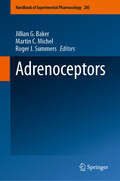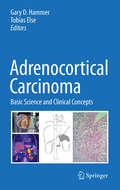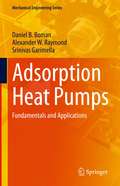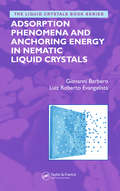- Table View
- List View
Adipose Tissue Protocols (Methods in Molecular Biology #155)
by Gérard AilhaudGérard Ailhaud and a team of laboratory experts and clinicians describe in step-by-step detail the major techniques needed for the study of adipose tissue and cells. Drawn from both in vivo and in vitro studies, these readily reproducible methods cover a broad range of techniques, including the choice of adipose tissue depot and of morphological techniques for work on both brown adipose tissue (BAT) and white adipose tissue (WAT). Major treatment is accorded to the isolation, subcellular fractionation, and transfection of low density adipocytes as well as metabolic aspects of nutrient uptake and assays of nutrient and ion fluxes. Innovative and highly practical, Adipose Tissue Protocols offers endocrinologists, physiologists, cell biologists, and pharmacologists a gold-standard collection of proven methods for effective research on adipose tissue from the nutritional to the physiological and the molecular levels.
Adipose Tissue Protocols (Methods in Molecular Biology #456)
by Kaiping YangThe radical expansion and revision of techniques and experimental approaches employed in the study of adipose tissue are reflected in this revised book. Several updated chapters are combined with many new contributions from internationally recognized experts. Conventional and state-of-the-art methodologies are covered, as well as whole animal, cellular and molecular approaches which have emerged in or been extended to adipose tissue research over the past few years. This revised all-in-one manual is essential reading for newcomers to this burgeoning area as well as a valuable volume for more experienced researchers.
Adipose Tissue and Adipokines in Health and Disease (Nutrition and Health)
by Giamila Fantuzzi Carol BraunschweigThe field of adipose tissue biology has been expanding at a very rapid pace in the last few years. Numerous advances have been made since publication of the first edition of this book, in terms of basic adipocyte biology, understanding of the determinants of obesity, distribution of body fat and weight loss, as well as the mechanisms linking excess adiposity to various co-morbidities Adipose Tissue and Adipokines in Health and Disease, Second Edition contains updated chapters from the previous volume but as the field has evolved, some areas covered in the first edition have been refocused to address the new knowledge The volume is divided in four sections: the first two deal with basic adipose tissue and adipokine biology, while the last two address the problem of obesity and alterations in adipose tissue function from an epidemiological and clinical standpoint The chapters are written by experts in their fields and include the most up to date scientific information Adipose Tissue and Adipokines in Health and Disease, Second Edition is a useful resource for physicians interested in adipose tissue biology and basic scientists who want to know more about applied aspects of the field The book targets endocrinologists, residents and fellows, internists, nutritionists and general practitioners who are exposed to an ever-expanding obese population.
Adipose Tissue and Cancer
by Mikhail G. KoloninRecent studies have shown that cells from adipose tissue are capable of trafficking to tumors, thus enabling paracrine action of adipokines from within the tumor microenvironment. Increased tumor vascularization, immune system suppression and direct effects on malignant cell survival and proliferation have been investigated as mechanisms regulated by adipokines. The goal of this book is to discuss data pointing to the role of adipose tissue in cancer and to dissect individual mechanisms through which adipose tissue excess or restriction could influence cancer progression.
Adipose-Derived Stem Cells: Methods And Protocols (Methods In Molecular Biology #702)
by Bruce A. Bunnell Jeffrey M. GimbleDuring the past decade, a wide range of scientific disciplines have adopted the use of adipose-derived stem/stromal cells (ASCs) as an important tool for research and discovery. In Adipose-Derived Stem Cells: Methods and Protocols, experts from the field, including members of the esteemed International Federation of Adipose Therapeutics and Science (IFATS), provide defined and established protocols in order to further codify the utilization of these powerful and accessible cells. With chapters organized around approaches spanning the discovery, pre-clinical, and clinical processes, much of the emphasis is placed on human ASC, while additional techniques involving small and large animal species are included. As a volume in the highly successful Methods in Molecular Biology™ series, the detailed contributions include introductions to their respective topics, lists of the necessary materials and reagents, step-by-step, readily reproducible laboratory protocols, and notes on troubleshooting and avoiding known pitfalls. Comprehensive and cutting-edge, Adipose-Derived Stem Cells: Methods and Protocols serves as a vital reference text for experienced researchers as well as new students on the path to further exploring the incredible potential of ASCs.
Adipose-Derived Stem Cells: Methods and Protocols (Methods in Molecular Biology #2783)
by Bruce A. Bunnell Jeffrey M. Gimble Trivia Frazier Cecilia SanchezSince the publication of the previous editions, there has been increased focus on the use of adipose-derived stromal/stem cells (ASC) and stromal vascular fraction (SVF) cells in three-dimensional hydrogel-based scaffolds for the development of microphysiological systems (MPS) serving as in vitro humanized assays and alternatives to in vivo pre-clinical animal models. This third edition volume discusses of the latest technology and advancements in the field of human-derived ASC and SVF. The chapters in this book are organized into four parts. Part One focuses on human ASC’s isolation, characterization, and differentiation. Part Two describes the isolation and characterization of ASC and SVF from canine, feline, and murine tissues. Part Three looks at hydrogels, scaffolds, and microphysiological systems, and Part Four talks about the new assays and applications using ASC. Written in the highly successful Methods in Molecular Biology series format, chapters include introductions to their respective topics, lists of the necessary materials and reagents, step-by-step, readily reproducible laboratory protocols, and tips on troubleshooting and avoiding known pitfalls.Cutting-edge and comprehensive, Adipose-Derived Stem Cells: Methods and Protocols, Third Edition is a valuable resource for both novice and experts researchers interested in learning more about this important and developing field.
Adipose-Derived Stem Cells: Methods and Protocols (Methods in Molecular Biology #702)
by Bruce A. Bunnell Jeffrey M. GimbleDuring the past decade, a wide range of scientific disciplines have adopted the use of adipose-derived stem/stromal cells (ASCs) as an important tool for research and discovery. In Adipose-Derived Stem Cells: Methods and Protocols, experts from the field, including members of the esteemed International Federation of Adipose Therapeutics and Science (IFATS), provide defined and established protocols in order to further codify the utilization of these powerful and accessible cells. With chapters organized around approaches spanning the discovery, pre-clinical, and clinical processes, much of the emphasis is placed on human ASC, while additional techniques involving small and large animal species are included. As a volume in the highly successful Methods in Molecular BiologyTM series, the detailed contributions include introductions to their respective topics, lists of the necessary materials and reagents, step-by-step, readily reproducible laboratory protocols, and notes on troubleshooting and avoiding known pitfalls. Comprehensive and cutting-edge, Adipose-Derived Stem Cells: Methods and Protocols serves as a vital reference text for experienced researchers as well as new students on the path to further exploring the incredible potential of ASCs.
Adjoint Topology Optimization Theory for Nano-Optics
by Yongbo DengThe book focuses on the topology optimization method for nano-optics. Both principles and implementing practice have been addressed, with more weight placed on applications. This is achieved by providing an in-depth study on the major topic of topology optimization of dielectric and metal structures for nano-optics with extension to the surface structures for electromagnetics. The comprehensive and systematic treatment of practical issues in topology optimization for nano-optics is one of the major features of the book, which is particularly suited for readers who are interested to learn practical solutions in topology optimization. The book can benefit researchers, engineers, and graduate students in the fields of structural optimization, nano-optics, wave optics, electromagnetics, etc.
Adjusting to Brain Injury: Reflections from Survivors, Family Members and Clinicians (After Brain Injury: Survivor Stories)
by Katherine Dawson Ashraf Sheikh Karl Hargreaves Meg Archer Lisa SummerillThis important book in the After Brain Injury: Survivor Stories Series tells the story of four people who suffered acquired brain injuries: Karl Hargreaves and Ashraf Sheikh as a result of road traffic accidents, Lisa Summerill because of a stroke and Meg Archer as a result of meningitis. Each person tells their story in their own words, describing what happened to them, how they dealt with it and how they experienced the recovery process. The cases represent very different types of people and severity of injury but are alike in providing raw accounts of the challenges faced whilst also highlighting their resilience and determination to carve out new lives. Alongside these inspirational stories are contributions by friends and family, as well as several members of the interdisciplinary rehabilitation team to give a broader view of the whole process of recovery. By combining expert commentary with real life experiences, this book points towards sources of support, normalises the experience and provides a context for understanding the challenges and successes in each case. This book provides support, understanding and hope for patients who have suffered a brain injury. It is valuable reading for any professional involved in neurorehabilitation and students of clinical neuropsychology.
Adjuvants and Agrochemicals: Volume 1: Mode Of Action and Physiological Activity
by Paul N. ChowStudies of Adjuvants involve many scientific fields from basic research of the chemistry, through investigations into physiological effects and environmental impact, to mixture formulation and field use. These important areas are illustrated in these two volumes, which are contributions from the First International Symposium on Adjuvants for Agrochemicals, held in Brandon, Manitoba on August 5 to 7, 1986. A total of 200 participants from 19 countries met to discuss their common interest in adjuvant science, technology, and application. It is the editors hope that these volumes will stimulate interest in and promote a better understanding of the chemical, physiological, and agronomic aspects of adjuvants as they relate agrochemicals. In addition, the revisedAdjuvants for Agrochemicals: A Selected Bibliography of World Literature in the English Language will be a valuable resource for agricultural researchers and other users. We hope that adjuvant research will lead to even safer, more efficient, and more economical use of chemicals in agriculture and forestry.
Adjuvants and Agrochemicals: Volume 2: Recent Development, Application, and Bibliography of Agro-Adjuvants
by Paul N. ChowStudies of Adjuvants involve many scientific fields from basic research of the chemistry, through investigations into physiological effects and environmental impact, to mixture formulation and field use. These important areas are illustrated in these two volumes, which are contributions from the First International Symposium on Adjuvants for Agrochemicals, held in Brandon, Manitoba on August 5 to 7, 1986. A total of 200 participants from 19 countries met to discuss their common interest in adjuvant science, technology, and application. It is the editors hope that these volumes will stimulate interest in and promote a better understanding of the chemical, physiological, and agronomic aspects of adjuvants as they relate agrochemicals. In addition, the revisedAdjuvants for Agrochemicals: A Selected Bibliography of World Literature in the English Language will be a valuable resource for agricultural researchers and other users. We hope that adjuvant research will lead to even safer, more efficient, and more economical use of chemicals in agriculture and forestry.
Admirable Evasions
by Theodore DalrympleIn Admirable Evasions, Theodore Dalrymple explains why human self-understanding has not been bettered by the false promises of the different schools of psychological thought. Most psychological explanations of human behavior are not only ludicrously inadequate oversimplifications, argues Dalrymple, they are socially harmful in that they allow those who believe in them to evade personal responsibility for their actions and to put the blame on a multitude of scapegoats: on their childhood, their genes, their neurochemistry, even on evolutionary pressures.Dalrymple reveals how the fashionable schools of psychoanalysis, behaviorism, modern neuroscience, and evolutionary psychology all prevent the kind of honest self-examination that is necessary to the formation of human character. Instead, they promote self-obsession without self-examination, and the gross overuse of medicines that affect the mind.Admirable Evasions also considers metaphysical objections to the assumptions of psychology, and suggests that literature is a far more illuminating window into the human condition than psychology could ever hope to be.
Admissible Consensus and Consensualization for Singular Multi-agent Systems (Engineering Applications of Computational Methods #11)
by Jianxiang Xi Le Wang Xiaogang Yang Jiuan Gao Ruitao LuThis book explores admissible consensus analysis and design problems concerning singular multi-agent systems, addressing various impact factors including time delays, external disturbances, switching topologies, protocol states, topology structures, and performance constraint. It also discusses the state-space decomposition method, a key technique that can decompose the motions of singular multi-agent systems into two parts: the relative motion and the whole motion. The relative motion is independent of the whole motion. Further, it describes the admissible consensus analysis and determination of the design criteria for different impact factors using the Lyapunov method, the linear matrix inequality tool, and the generalized Riccati equation method. This book is a valuable reference resource for graduate students of control theory and engineering and researchers in the field of multi-agent systems.
Admissions: Life as a Brain Surgeon
by Henry MarshThe International Bestseller"Consistently entertaining...Honesty is abundantly apparent here--a quality as rare and commendable in elite surgeons as one suspects it is in memoirists." —The Guardian"Disarmingly frank storytelling...his reflections on death and dying equal those in Atul Gawande's excellent Being Mortal." —The EconomistHenry Marsh has spent a lifetime operating on the surgical frontline. There have been exhilarating highs and devastating lows, but his love for the practice of neurosurgery has never wavered. Following the publication of his celebrated New York Times bestseller Do No Harm, Marsh retired from his full-time job in England to work pro bono in Ukraine and Nepal. In Admissions he describes the difficulties of working in these troubled, impoverished countries and the further insights it has given him into the practice of medicine. Marsh also faces up to the burden of responsibility that can come with trying to reduce human suffering. Unearthing memories of his early days as a medical student, and the experiences that shaped him as a young surgeon, he explores the difficulties of a profession that deals in probabilities rather than certainties, and where the overwhelming urge to prolong life can come at a tragic cost for patients and those who love them.Reflecting on what forty years of handling the human brain has taught him, Marsh finds a different purpose in life as he approaches the end of his professional career and a fresh understanding of what matters to us all in the end.
Admixture Dynamics, Natural Selection and Diseases in Admixed Populations (Springer Theses)
by Wenfei JinIn this thesis, Dr. Jin presents the distribution of ancestral chromosomal segments in the admixed genome, which could provide the information needed to explore population admixture dynamics. The author derives accurate population histories of African Americans and Mexicans using genome-wide single nucleotide polymorphisms (SNPs) data. Mapping the genetic background facilitates the study of natural selection in the admixed population, and the author identifies the signals of selection in African Americans since their African ancestors left for America. He further demonstrates that many of the selection signals were associated with African American-specific high-risk diseases such as prostate cancer and hypertension, suggesting an important role these disease-related genes might have played in adapting to their new environment. Lastly, the author reveals the complexity of natural selection in shaping human susceptibility to disease. The thesis significantly advances our understanding of the recent population admixture, adaptation to local environment and its health implications.
Adolescence
by Laurence SteinbergCutting-edge science, personalized for today’s students. <p><p> As a well-respected researcher, Laurence Steinberg connects current research with real-world application, helping students see the similarities and differences in adolescent development across different social, economic, and cultural backgrounds. <p><p> Through an integrated, personalized digital learning program, students gain the insight they need to study smarter, stay focused, and improve their performance.
Adolescent Forensic Psychiatry
by Susan Bailey Mairead DolanAdolescent Forensic Psychiatry discusses a broad range of issues based around the psychiatric needs of adolescents and how these relate to offending behaviour. Its well-structured approach looks at assessment, treatment and outcomes for different disorders and highlights the importance of effective interaction between specialist agencies. Services
Adolescents and Adults with Learning Disabilities and ADHD
by Noël GreggMost of the literature on learning disabilities and attention-deficit/hyperactivity disorder (ADHD) focuses on the needs of elementary school-age children, but older students with these conditions also require significant support. Comprehensive and authoritative, this book helps educators and clinicians navigate the maze of laws, policies, and scientific research relating to diagnostic and intervention decision making for adolescents and adults. Leading expert No\u00ebl Gregg provides clear guidance on how to conduct and document evidence-based assessments and select appropriate instructional and testing accommodations. Featuring helpful case vignettes, decision-making flowcharts, and coverage of the latest assistive technologies, the book gives special attention to supporting students during the crucial transition from high school to higher education or vocational settings.
Adoption of LMS in Higher Educational Institutions of the Middle East (Advances in Science, Technology & Innovation)
by Hassan Qudrat-Ullah Rashid A. KhanThis book discusses the adoption of learning management systems (LMS) in higher education institutions. It presents influential predictors that may impact instructors’ behavioral intention to adopt learning management systems in the context of Arab culture, as well as a unique model of technology acceptance that draws on and combines previous technology adoption models (i.e., a modified unified theory of acceptance and use of technology model – UTAUT2). Moreover, this study extends the UTAUT2 model by including Hofstede’s (1980) cultural dimensions, and technology awareness as the moderators of the model. It also describes the explanatory technique approach used to collect quantitative data from the instructors at higher education institutions in Saudi Arabia and were analyzed with structural equation modeling using SPSS/Amos software. The findings revealed that facilitating conditions were the strongest predictor of behavioral intention to adopt an LMS, followed by performance expectancy and hedonic motivation, technology awareness, and cultural dimensions exerted a moderating influence on instructors’ behavioral intention to use LMS in their teaching. By including new constructs, this becomes the first study of its kind exploring instructors’ use of LMS in Higher Educational Institutions of Saudi Arabia and other countries of the Middle East. It offers practical insights for a broad range of researchers and professionals at higher education institutions and serves as a reference guide for designers of learning management systems (e.g., blackboard systems), policymakers, and the Ministry of Education staff.
Adoptive Cellular Immunotherapy of Cancer
by H. C. StevensonThis volume presents the most complicated and powerful cancer biotherapies developed. It provides an overview of human immune system function and the mechanisms by which adoptive cellular immunotherapies (ACI) harnesses the activity. The volume provides a vision on the developments in ACI.
Adrenal Toxicology (Target Organ Toxicology Series)
by Philip W. Harvey David J. Everett Christopher J. SpringallDespite being regarded as the most common toxicological target in the endocrine system, the adrenal gland has often been neglected in regulatory testing. Adrenal Toxicology addresses the increased interest in adrenocortical toxicology and the need for a resource that makes techniques available to examine adrenal endocrine disruption. Examining curr
Adrenoceptors (Handbook of Experimental Pharmacology #285)
by Martin C. Michel Jillian G. Baker Roger J. SummersAdrenoceptors have been at the forefront of physiological and pharmacological research for a century. They served as prototypes for rationale drug design as recognized by a Nobel Prize to Sir James Black and for the molecular understanding and structure of G protein-coupled receptors as recognized by a Nobel Prize to Brian Kobilka and Robert J. Lefkowitz. Drugs directly or indirectly targeting adrenoceptors have become guideline-recommended treatments for more than 30 human and various animal diseases. This volume assembles leading experts on various types of adrenoceptor research to provide concise insight into the current standing and future direction of uses of adrenoceptor-targeted drugs and research in this field.
Adrenocortical Carcinoma: Basic Science and Clinical Concepts
by Gary D. Hammer Tobias ElseWe anticipate the book to be a definitive text on the subject that explores all aspects of the study of adrenal cancer and the treatment of patients with the disease. Chapters will cover epidemiology, pathogenesis, genetics, cancer stem cells, historic and emerging therapies, mouse models of adrenal cancer, new developments in tumor profiling, worldwide collaborative groups and tumor registries together with resources for the practitioner and community of adrenal cancer scientists. We do not wish this book to compete with the other larger books in the Endocrine and Endocrine Surgery literature. In addition, it is not expected to cover benign adrenal diseases that have been covered in detail in other venues. We envision this book to be a very specialized and exhaustive text on basic, translational and clinical aspects of adrenal cancer.
Adsorption Heat Pumps: Fundamentals and Applications (Mechanical Engineering Series)
by Daniel B. Boman Alexander W. Raymond Srinivas GarimellaThis volume introduces the fundamentals of adsorption heat pumps, beginning with the simplest cycle and building to the most complex. Selection of adsorbents and refrigerants, design of adsorption beds and auxiliary heat exchangers, and applications for different designs are all discussed. The book educates engineering students, engineers, and researchers about an environmentally friendly alternative to vapor compression refrigeration systems promising for many applications. The authors cover thermodynamic cycles, working materials for the cycles, and aspects of designing and modeling adsorption heat pumps.Elucidates the various applications of adsorption heat pumps;Illustrates modeling techniques for quickly screening new working materials early in their development;Provides comprehensive review of cycle types, with discussion of the applications for which they are best suited;Appropriate for graduate courses on advanced thermodynamics, design of thermal systems, sustainable energy technology, refrigeration technologies, and thermal control of electronics.
Adsorption Phenomena and Anchoring Energy in Nematic Liquid Crystals
by Giovanni Barbero Luiz Roberto EvangelistaDespite the large quantity of phenomenological information concerning the bulk properties of nematic phase liquid crystals, little is understood about the origin of the surface energy, particularly the surface, interfacial, and anchoring properties of liquid crystals that affect the performance of liquid crystal devices. Self-contained and unique,
